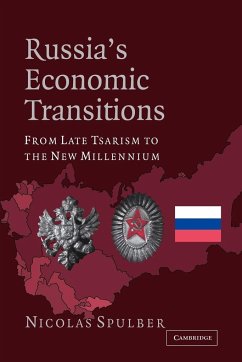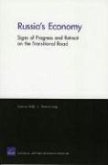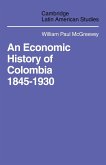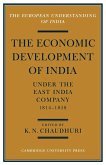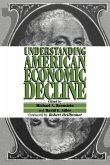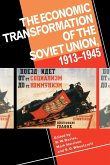Examines the three major transformations that the country underwent from the early 1860s to 2000.
Russia's Economic Transitions examines the three major transformations that the country underwent from the early 1860s to 2000. The first transition, under Tsarism, involved the partial break-up of the feudal framework of land ownership and the move toward capitalist relations. The second, following the Communist revolution of 1917, brought to power a system of state ownership and administration - a sui generis type of war-economy state capitalism - subjecting the economy's development to central commands. The third, started in the early 1990s and still unfolding, is aiming at reshaping the inherited economic fabric on the basis of private ownership. The three transitions originated within different settings, but with a similar primary goal, namely the changing of the economy's ownership pattern in the hopes of providing a better basis for subsequent development. The treatment's originality, impartiality and historical breadth have cogent economic, social and political relevance.
Review quote:
'The book is a massive undertaking, covering almost two centuries. Spulber is attempting to look at the three major transitions of Russian economic history - the decision to 'modernize' after the Crimean War, the Soviet industrialization drive and ensuing modernization of the Soviet Union, and the Russian transition after 1991. It is a monumental scholarly effort. No one else has tried such a project, so it will stand alone.' Paul R. Gregory, University of Houston, Texas
'Spulber's book on Russia's economic transition is very challenging and commands profound respect.' Financial History Review
Table of contents:
Preface; Part I. The Tsarist Economic Transition: i. State Economy and Society: 1. The socio-economic framework; 2. The transition issues; 3. The economic policies; ii. Sectoral Growth and Change: 4. The problems of agriculture; 5. The industrial changes; 6. Domestic and foreign trade; iii. Social Accounting: 7. Money and banking; 8. State finance; 9. Overall view; Part II. The Soviet Economic Transition: i. State Economy and Society: 10. The socio-economic framework; 11. The transition issues; 12. The economic policies; ii. Sectoral Growth and Change: 13. The problems of agriculture; 14. The industrial changes; 15. Domestic and foreign trade; iii. Social Accounting: 16. Money and banking; 17. State finance; 18. Overall view; Part III. The Post Soviet Economic Transition: i. State Economy and Society: 19. The socio-economic framework; 20. The transition issues; 21. The economic policies; ii. Sectoral Growth and Change: 22. The problems of agriculture; 23. The industrial changes; 24. Domestic and foreign trade; iii. Social Accounting: 25. Money and banking; 26. State finance; 27. Overall view; Index.
Russia's Economic Transitions examines the three major transformations that the country underwent from the early 1860s to 2000. The first transition, under Tsarism, involved the partial break-up of the feudal framework of land ownership and the move toward capitalist relations. The second, following the Communist revolution of 1917, brought to power a system of state ownership and administration - a sui generis type of war-economy state capitalism - subjecting the economy's development to central commands. The third, started in the early 1990s and still unfolding, is aiming at reshaping the inherited economic fabric on the basis of private ownership. The three transitions originated within different settings, but with a similar primary goal, namely the changing of the economy's ownership pattern in the hopes of providing a better basis for subsequent development. The treatment's originality, impartiality and historical breadth have cogent economic, social and political relevance.
Review quote:
'The book is a massive undertaking, covering almost two centuries. Spulber is attempting to look at the three major transitions of Russian economic history - the decision to 'modernize' after the Crimean War, the Soviet industrialization drive and ensuing modernization of the Soviet Union, and the Russian transition after 1991. It is a monumental scholarly effort. No one else has tried such a project, so it will stand alone.' Paul R. Gregory, University of Houston, Texas
'Spulber's book on Russia's economic transition is very challenging and commands profound respect.' Financial History Review
Table of contents:
Preface; Part I. The Tsarist Economic Transition: i. State Economy and Society: 1. The socio-economic framework; 2. The transition issues; 3. The economic policies; ii. Sectoral Growth and Change: 4. The problems of agriculture; 5. The industrial changes; 6. Domestic and foreign trade; iii. Social Accounting: 7. Money and banking; 8. State finance; 9. Overall view; Part II. The Soviet Economic Transition: i. State Economy and Society: 10. The socio-economic framework; 11. The transition issues; 12. The economic policies; ii. Sectoral Growth and Change: 13. The problems of agriculture; 14. The industrial changes; 15. Domestic and foreign trade; iii. Social Accounting: 16. Money and banking; 17. State finance; 18. Overall view; Part III. The Post Soviet Economic Transition: i. State Economy and Society: 19. The socio-economic framework; 20. The transition issues; 21. The economic policies; ii. Sectoral Growth and Change: 22. The problems of agriculture; 23. The industrial changes; 24. Domestic and foreign trade; iii. Social Accounting: 25. Money and banking; 26. State finance; 27. Overall view; Index.

